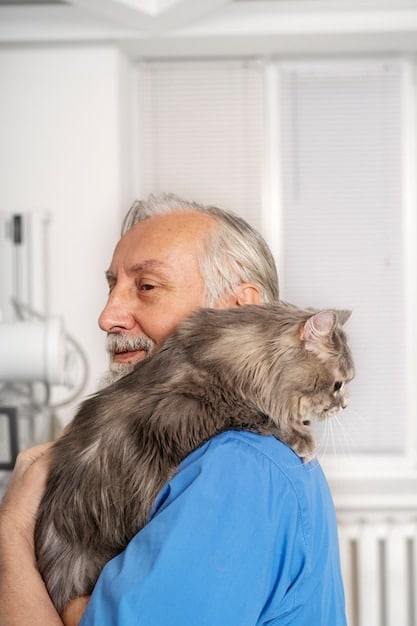Senior Pet Discounts: Save Money on Pet Care for Seniors

Senior pet discounts offer financial relief to senior pet owners by reducing the cost of veterinary care, medications, food, and other pet-related expenses, ensuring their beloved companions receive the necessary care during their golden years.
Navigating the world of pet ownership as a senior can bring immense joy, but it also comes with financial considerations, especially as our furry friends age alongside us. Senior pet discounts: A comprehensive guide to saving money on senior pet care can significantly ease the financial burden, ensuring your beloved companion receives the best possible care without straining your budget.
Understanding Senior Pet Discounts
As pets enter their senior years, they often require more frequent veterinary visits and specialized care. Recognizing this increased need, many organizations and businesses offer senior pet discounts to help alleviate the financial stress associated with these expenses.
These discounts are typically designed to provide financial assistance to senior citizens who own pets, making essential services and products more accessible and affordable. Understanding the types of discounts available and how to access them is crucial for any senior pet owner looking to manage their pet care costs effectively.
Who Qualifies for Senior Pet Discounts?
Eligibility for senior pet discounts generally depends on the age of the pet owner. While specific age requirements can vary, most programs consider individuals aged 60 or 65 and older as eligible. Additionally, some programs may have income restrictions or require proof of senior status, such as a driver’s license or senior citizen ID card.
Types of Discounts Available
Senior pet discounts come in various forms, each designed to address different aspects of pet care costs. These can include discounts on veterinary services, medications, pet food, and even pet insurance. Understanding the range of available discounts can help you tailor your savings strategy to best suit your pet’s needs.
- Veterinary Care Discounts: Many veterinary clinics offer reduced rates on routine check-ups, vaccinations, and other medical procedures for senior pets.
- Medication Discounts: Pharmacies and online retailers may provide discounts on prescription medications, helping to manage the ongoing health needs of aging pets.
- Pet Food Discounts: Some pet food manufacturers and retailers offer special pricing on senior formulas, designed to support the specific dietary needs of older animals.
- Pet Insurance Discounts: Certain pet insurance providers offer discounted premiums for senior pet owners, helping to protect against unexpected medical expenses.
By exploring and utilizing these discounts, senior pet owners can ensure their pets receive the care they need without compromising their financial stability. It’s all about knowing where to look and what questions to ask.
Finding Local Veterinary Discounts
One of the most significant expenses in senior pet care is veterinary treatment. Finding local veterinary discounts can make a substantial difference in your pet care budget. Many clinics are eager to support senior pet owners in their community.
Local veterinary discounts can range from reduced consultation fees to discounted rates on specific procedures. These discounts not only benefit the pet owner financially but also ensure that senior pets receive the regular care they need to maintain their health and well-being.

Start with Your Current Vet
The first place to inquire about discounts is your current veterinarian. Many established clinics value long-term relationships and may offer special rates or payment plans for senior clients. Don’t hesitate to ask about any available discounts or flexible payment options.
Research Local Clinics
If your current vet doesn’t offer senior discounts, research other clinics in your area. Check their websites for advertised promotions or call to inquire about senior-specific pricing. Some clinics may also partner with local senior centers or organizations to offer exclusive discounts.
- Online Directories: Use online directories like Yelp or Google Maps to find local veterinary clinics and read reviews from other pet owners.
- Senior Centers: Contact local senior centers to inquire about partnerships with veterinary clinics that offer discounts to their members.
- Community Bulletin Boards: Check community bulletin boards at libraries, community centers, and local businesses for advertisements about veterinary discounts.
Finding the right veterinary clinic that offers senior discounts can significantly reduce your pet care expenses. It requires a bit of research, but the savings and peace of mind are well worth the effort. Remember to always verify the legitimacy of any discounts and ensure the clinic provides high-quality care.
Online Pharmacies and Medication Savings
Medications can represent a considerable portion of senior pet care costs, especially for pets with chronic conditions. Utilizing online pharmacies and exploring medication savings options can provide significant financial relief.
Online pharmacies often offer lower prices on prescription medications compared to traditional brick-and-mortar pharmacies. Additionally, various discount programs and coupons can further reduce the cost. These savings can be particularly beneficial for senior pets who require long-term medication.
Compare Prices and Read Reviews
Before purchasing medications online, compare prices from different pharmacies to ensure you are getting the best deal. Additionally, read reviews from other customers to verify the pharmacy’s reputation and reliability. Look for pharmacies that are certified by the National Association of Boards of Pharmacy (NABP).
Generic Medications
Consider generic medications as a cost-effective alternative to brand-name drugs. Generic medications contain the same active ingredients as their brand-name counterparts but are typically available at a lower price. Consult with your veterinarian to determine if a generic option is suitable for your pet’s condition.

- Auto-Ship Programs: Many online pharmacies offer auto-ship programs that provide additional discounts on recurring medication orders.
- Coupon Codes: Search online for coupon codes that can be applied to your medication purchases.
- Prescription Discount Cards: Use prescription discount cards, which are often available for free, to save on medications at participating pharmacies.
By taking advantage of online pharmacies and medication savings strategies, senior pet owners can significantly reduce their pet care expenses. It’s essential to ensure the medications are sourced from reputable pharmacies and that your veterinarian approves any changes in medication.
Pet Food Assistance Programs
Providing a balanced and nutritious diet is essential for senior pets, but the cost of specialized senior pet food can add up. Pet food assistance programs can help alleviate this financial burden by providing discounted or free food to eligible pet owners.
These programs are typically run by non-profit organizations, animal shelters, and pet food manufacturers. They aim to ensure that senior pets receive proper nutrition, regardless of their owner’s financial situation. Knowing where to find these programs can be a lifeline for many senior pet owners.
Local Food Banks and Shelters
Many local food banks and animal shelters offer pet food assistance programs to low-income individuals and families. Contact your local food bank or animal shelter to inquire about eligibility requirements and available resources. These programs often rely on donations from the community and may have limited supplies.
Pet Food Manufacturers
Some pet food manufacturers offer discount programs or coupons for senior pet food formulas. Check the manufacturer’s website or contact their customer service department to learn about available savings opportunities. These programs may require proof of senior status or income eligibility.
- Senior Centers: Partnering with local senior centers to distribute pet food to eligible seniors.
- Veterinary Clinics: Offering pet food assistance as part of their senior pet care packages.
- Online Applications: Streamlining the application process through online forms and documentation uploads.
Accessing pet food assistance programs can significantly reduce the financial strain of feeding a senior pet. By exploring these resources, senior pet owners can ensure their pets receive the nutrition they need to thrive. Always remember to check the quality and suitability of the food for your pet’s specific dietary needs.
Pet Insurance Options for Seniors
Pet insurance can provide financial protection against unexpected veterinary expenses, offering peace of mind to senior pet owners. While it might seem like an additional cost, pet insurance can save you from significant financial strain in the event of a medical emergency.
Several pet insurance companies offer plans specifically designed for senior pets, with coverage options tailored to their unique health needs. Knowing the different types of coverage and the potential benefits can help you make an informed decision about whether pet insurance is right for you and your pet.
Coverage Options
Pet insurance plans typically offer coverage for accidents, illnesses, and routine care. Accident-only plans cover expenses related to injuries, such as broken bones or accidental poisoning. Illness plans cover expenses related to medical conditions, such as cancer or arthritis. Routine care plans cover expenses related to preventive care, such as vaccinations and dental cleanings.
Factors Affecting Premiums
The cost of pet insurance premiums can vary depending on several factors, including the pet’s age, breed, and location, as well as the coverage level and deductible. Older pets typically have higher premiums due to their increased risk of developing health problems. However, shopping around and comparing quotes from different insurance providers can help you find an affordable plan.
- Deductibles: Choosing a higher deductible can lower your monthly premium.
- Co-pays: Understanding the co-pay percentage, which is the portion of the veterinary bill you are responsible for.
- Waiting Periods: Knowing the waiting period before coverage begins.
Weighing the costs and benefits of pet insurance is a crucial step in ensuring the long-term health and well-being of your senior pet. By researching and comparing different plans, you can find a policy that provides adequate coverage without breaking the bank.
Additional Tips for Saving Money
Besides discounts and assistance programs, several other strategies can help senior pet owners save money on pet care. These tips involve proactive planning, smart shopping, and maximizing available resources.
Implementing these strategies can make a significant difference in your overall pet care budget, allowing you to provide the best possible care for your senior pet without financial stress. Small changes in your approach to pet care can lead to substantial savings over time.
Preventative Care
Investing in preventative care can help avoid costly medical emergencies down the road. Regular check-ups, vaccinations, and dental cleanings can detect potential health problems early, allowing for timely and less expensive treatment. Work closely with your veterinarian to develop a preventative care plan tailored to your pet’s specific needs.
DIY Grooming
Grooming expenses can add up, especially for long-haired breeds. Consider learning how to groom your pet at home to save money on professional grooming services. Invest in basic grooming tools, such as brushes, combs, and nail clippers, and follow online tutorials to learn proper grooming techniques. Not only will you save money, but you’ll also strengthen the bond with your pet.
- Buy in Bulk: Purchasing pet food and supplies in bulk can often result in significant savings.
- Join Loyalty Programs: Many pet stores offer loyalty programs that provide discounts and rewards on your purchases.
- Compare Prices: Always compare prices from different retailers before making a purchase to ensure you are getting the best deal.
By implementing these additional tips, senior pet owners can further reduce their pet care expenses and ensure their pets receive the care they deserve. It’s all about being proactive, informed, and resourceful in managing your pet care budget.
| Key Point | Brief Description |
|---|---|
| ⚕️ Veterinary Discounts | Local clinics offer reduced rates for senior pets. |
| 💊 Medication Savings | Online pharmacies and generic medications can save money. |
| 🐾 Pet Food Programs | Assistance programs provide discounted or free pet food. |
| 🛡️ Pet Insurance | Insurance can protect against unexpected veterinary bills. |
Frequently Asked Questions
▼
Generally, small dogs and cats are considered senior around age 11, while larger dog breeds may be considered senior around age 7 or 8.
▼
Start by checking with your current vet and local senior centers. Online directories and community bulletin boards can also list available discounts.
▼
Yes, if they are certified by the National Association of Boards of Pharmacy (NABP). Always compare prices and read customer reviews before purchasing.
▼
Pet insurance plans for seniors often cover accidents, illnesses, and sometimes routine care. However, coverage and premiums vary, so research thoroughly.
▼
Absolutely. Regular check-ups, vaccinations, and dental care can detect potential health issues early, preventing costly emergencies later on.
Conclusion
Navigating the world of senior pet care can be financially challenging, but by leveraging senior pet discounts, exploring assistance programs, and implementing smart money-saving strategies, you can ensure your beloved companion receives the best possible care without straining your budget. Remember to stay informed, proactive, and resourceful in managing your pet care expenses, and cherish the golden years with your furry friend.





